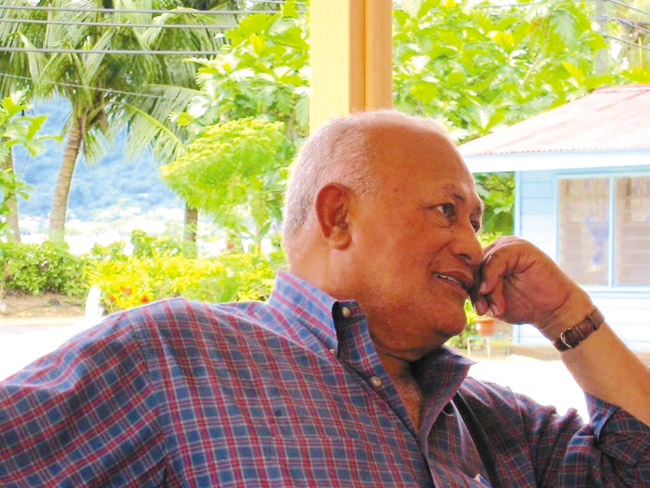‘You Could Always Depend On Lee’
Friends and family bid a fond and final aloha last Wednesday to Li’amanaia “Lee” Afuvai, and I was struck by the confluence of friends and numbers. For starters, his funeral coincided with the 20th anniversary of my starting as editor of Mid-Week.
I first met Lee 35 years ago this month, in the first days of my stint as a daily columnist with the Honolulu Advertiser. Lee called, and drove me all over town to restaurants and night clubs, introducing me to a ton of people he thought would be helpful for the column. That included seeing Andy Bumatai open for the Beamer Brothers at the Reef Showroom. He took me everywhere, that is, except the Point After at the Hawaiian Regent, which he ran.
Among those Lee introduced me to was Mickey Hummer, who in those days ran Boyd’s, and who in turn introduced me to legendary restaurateur Henry Loui, whom I would come to call “my Chinese father.” One connection leads to another and another, on and on.
I would, of course, make it to the Point After (often), and it was there I first met Bob Apisa through Lee. We’ve been close friends for decades, and that led to Bob Hogue telling an amazing story about Bob Apisa in his column this week (Page 80). It’s the kind of story that could be told in a movie, and begins and ends with moments that could be commemorated in a Norman Rockwell painting if he were still at his brushes.
In large part because of my friendship with Lee and Bob, one of the guiding tenents of my life is: “You can never have enough Samoan friends.”
I believe the first time I said that was the 1980 night Frank Fasi lost the Honolulu mayorship to Eileen Anderson. Fasi had planned his victory party at Boyd’s and the adjacent courtyard in the old Alexander Young Hotel (site of Bishop Square today). Entering the premises, one of Fasi’s Samoan bodyguards knocked over Mickey’s young daughter Shannon, and didn’t bother to apologize, much less pick her up — eh, the mayor was coming through. Mickey reacted as any father would, with angry words. I recall the tension in the air, and thinking we could have some fisticuffs — Mickey had been a boxer in his younger days, but he was outmanned (and outsized). So Mickey called Lee at the Point After, and he sent some of his boys down to Boyd’s ASAP. Turned out Fasi’s guys and Lee’s guys were cousins, and everything was cool.
Lee and I had another connection: We’re both Oregon Ducks. Lee went there to play football and recalled that to make a few dollars on the side he did a one-man Polynesian show in small-town Oregon bars and restaurants.
Back in Hawaii, he returned to show business and worked as manager of Don Ho’s show at Duke Kahanamoku’s when that was the hottest ticket in town. Later, the Point After was so popular, some called Lee “the mayor of Waikiki.”
He may have started in show biz, but he had a keen intellect and interest in politics and world affairs. I recall dining with Lee and American Samoa’s governor and delegate to Congress. In the ’80s he started his career in state government, working for Gov. John Waihee and later in the Cayetano and Lingle administrations.
Waihee spoke at the funeral, and said, “You could always depend on Lee; he always followed through.” He also mentioned how Lee helped plan the 50th anniversary commemoration of the Pearl Harbor attack, including details to have President George H.W. Bush attend.
During those years, my kids and I would run into Lee and wife Jeanne with grandkids at the food court at Windward Mall. He’d come quite a ways from running the hottest disco in Waikiki.
In the end, I’ll remember Lee’s generous spirit, and be grateful our lives intersected and for the friendships he began with his introductions.
dchapman@midweek.com






